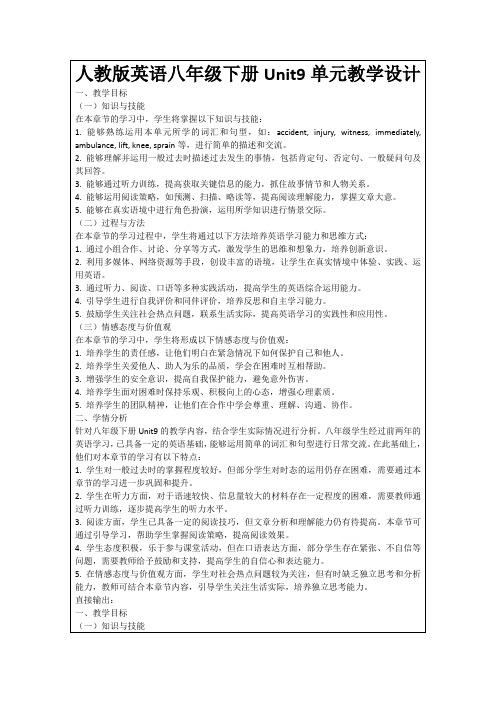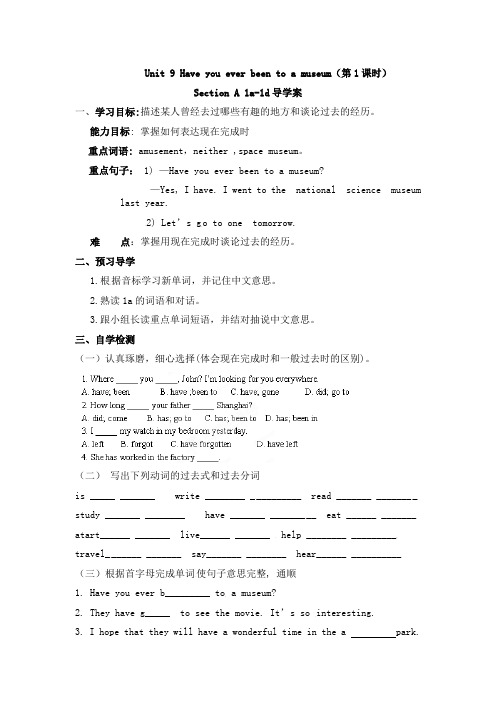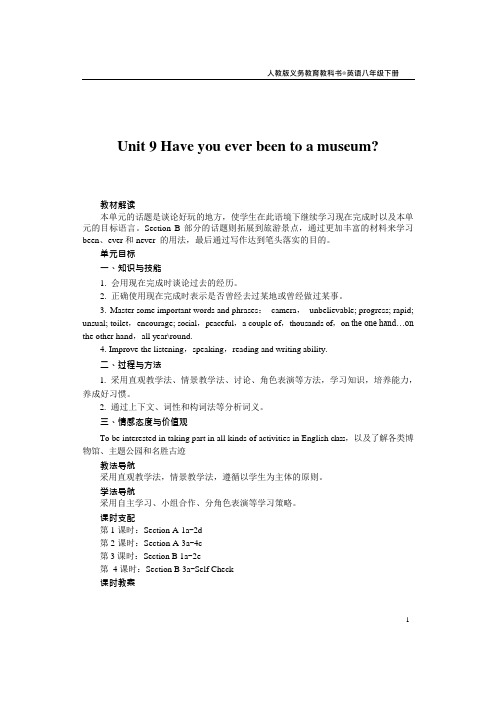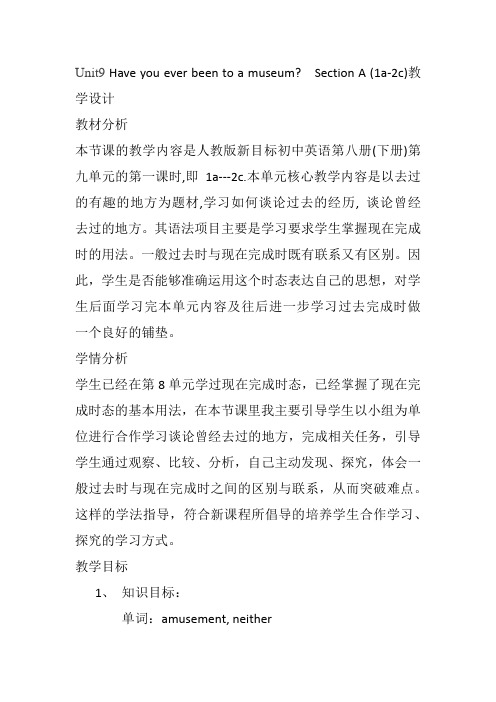人教版英语八年级下册 Unit9 学案设计(无答案)
人教版英语八年级下册Unit9单元教学设计

在讲授新知环节,我会结合教材内容,系统地讲解本单元的重点词汇、短语和语法。首先,通过示例句和情景对话,让学生了解并掌握词汇的含义和用法,如accident, injury, witness, immediately, ambulance等。
(三)学生小组讨论(500字)
在学生掌握了一定的新知识后,我会组织他们进行小组讨论。将学生分成若干小组,每组挑选一个事故场景,用英语描述事故发生的过程,并讨论如何提供急救。在这个过程中,学生可以自由发挥,运用所学词汇和语法知识。
在导入环节,我将采用图片展示和问题引导的方式,激发学生的兴趣和好奇心。首先,在大屏幕上展示一组与accident相关的图片,如交通事故、运动伤害等,让学生观察并思考这些场景的共同点。随后,提出以下问题:“Have you ever had an accident? What happened? How did you feel?”引导学生分享自己的经历和感受。
本章节的学习将引导学生形成正确的价值观,关注社会热点问题,培养他们的责任感和关爱他人的意识。通过学习本单元关于事故和急救的知识,学生能增强安全意识,学会在紧急情况下如何保护自己和他人。此外,通过小组合作,学生将培养团队精神,学会尊重和理解他人,形成积极向上的人生态度。
四、教学内容与过程
(一)导入新课(500字)
(一)知识与技能
本章节旨在帮助学生掌握人教版英语八年级下册Unit9的词汇和语法知识,提升他们的英语表达能力。通过学习,学生能熟练运用accident, injury, witness, immediately, ambulance等词汇,以及一般过去时态来描述过去的事件。此外,学生将通过听力练习,提高信息捕捉能力,通过阅读训练,增强理解与分析文本的能力。
Unit9教学设计人教版八年级英语下册

人教版八年级英语下册第九单元同步教学设计Unit 9Have you ever been to a museum?1.本单元话题以“有趣的地方”展开,情境属于2022新课标“人与社会”主题范畴中的“历史、社会与文化”这一主题群,涉及子主题“世界主要国家的文化习俗与文化景观、节假日与庆祝活动”。
2.单元主题体现《中国学生发展核心素养》中的“文化基础”方面,提升学生的“人文底蕴”这一素养,立足于“审美情趣”这一基本要点。
3.了解国内外各类博物馆、主题公园以及一些名胜古迹,体会旅游的乐趣。
4.发现生活中美好的事物并学会与他人分享。
5.能正确使用现在完成时谈论过去的经历。
6.能询问和谈论曾经游览过的地方。
7.了解新加坡的语言、食物、气候和特色。
续表【课时建议】本单元建议5课时Section A (1a-2d)(一课时)Section A (3a-3c)(一课时)Section A (Grammar Focus-4c)(一课时)Section B (1a-1d)(一课时)Section B (2a-Self Check)(一课时)词汇短语:主要采用多媒体展示及动作演示法。
基本句子:采用多媒体展示及交际法(利用多媒体展示两人进行交际时的情景)。
语法:含ever、never的现在完成时。
第一课时Section A (1a-2d)Step 1情景导入T:You have already learned to talk about past experiences.In the unit,we are going to learn a new way to talk about past experiences.Questions:T:Have you ever been to Beijing?________________________________________________________________________Have you ever been to a museum?________________________________________________________________________S:Yes,I have./No,I haven't.设计意图:通过课前的师生的问答,既交代了本单元的重点,又吸引了学生的注意力,易于激发学生的学习兴趣。
英语人教版八年级下册unit9。教学设计

Unit 9 Have you ever been to a museum(第1课时)Section A 1a-1d导学案一、学习目标:描述某人曾经去过哪些有趣的地方和谈论过去的经历。
能力目标: 掌握如何表达现在完成时重点词语: amusement,neither ,space museum。
重点句子: 1) —Have you ever been to a museum?—Yes, I have. I went to the national science museum last year.2) Let’s g o to one tomorrow.难点:掌握用现在完成时谈论过去的经历。
二、预习导学1.根据音标学习新单词,并记住中文意思。
2.熟读1a的词语和对话。
3.跟小组长读重点单词短语,并结对抽说中文意思。
三、自学检测(一)认真琢磨,细心选择(体会现在完成时和一般过去时的区别)。
(二)写出下列动词的过去式和过去分词is _____ _______ write ________ __________ read _______ ________study _______ ________ have _______ _________ eat ______ _______atart______ _______ live______ _______ help ________ _________travel_______ _______ say_______ ________ hear______ __________(三)根据首字母完成单词使句子意思完整, 通顺1. Have you ever b_________ to a museum?2. They have g_____ to see the movie. It’s so interesting.3. I hope that they will have a wonderful time in the a park.4. ------I have never seen such an interesting water park.----Me n .5. I like animals in water . So I’m going to an a四、合作探究现在完成时(一)I.用法:现在完成时表示过去发生的动作对现在造成的影响或结果。
(完整版)人教版八年级英语下册unit9教案(可编辑修改word版)

Unit 9 Have you ever been to a museum?教材解读本单元的话题是谈论好玩的地方,使学生在此语境下继续学习现在完成时以及本单元的目标语言。
Section B 部分的话题则拓展到旅游景点,通过更加丰富的材料来学习been、ever 和never 的用法,最后通过写作达到笔头落实的目的。
单元目标一、知识与技能1.会用现在完成时谈论过去的经历。
2.正确使用现在完成时表示是否曾经去过某地或曾经做过某事。
3.Master some important words and phrases:camera,unbelievable; progress; rapid; unsual; toilet,encourage; social,peaceful,a couple of,thousands of,on the one hand…on the other hand,all year\round.4.Improve the listening,speaking,reading and writing ability.二、过程与方法1.采用直观教学法、情景教学法、讨论、角色表演等方法,学习知识,培养能力,养成好习惯。
2.通过上下文、词性和构词法等分析词义。
三、情感态度与价值观To be interested in taking part in all kinds of activities in English class,以及了解各类博物馆、主题公园和名胜古迹教法导航采用直观教学法,情景教学法,遵循以学生为主体的原则。
学法导航采用自主学习、小组合作、分角色表演等学习策略。
课时支配第1 课时:Section A 1a-2d第2 课时:Section A 3a-4c第3 课时:Section B 1a-2e第 4 课时:Section B 3a-Self Check课时教案1第1 课时Section A 1a-2d教学目标一、知识与技能1.Key vocabulary:amusement; neither.2.Listening practice.3.Target language:Lets’ go somewhere different today.Have you ever been to…? Yes,I have./ No,I haven’t.How about/what about…?How are we going to get there?We can take the subway/…4.To train students’ listening and speaking skills.二、过程与方法采用直观教学法,情景教学法,小组讨论与交流来认识并掌握目标语言。
八年级英语下Unit9学案人教版

八年级英语下册预习学案Unit9 Have you ever been to an amusement park?一预习课题:八年级英语下册Unit9第一课时 SectionA 1a-----2c设计人宁阳二十一中张欣二预习目标:1、能够使用现在完成时介绍自己曾经到过的地方。
2、能够使用目现在完成时标语言了解别人曾经去过的地方。
3、能够使用现在完成时目标语言介绍别人曾经去过的地方。
4、能够使用现在完成时目标语言了解别人曾经做过的事。
三预习重点:词汇:a musement, amusement park, water park, haven’t, neither, river, 语法句型:1. 复习第六单元学习的现在完成进行时.How long have you been skating?I’ve been skating since nine o’clock.I’ve been skating since I was seven years old.I’ve been skating for five hours.2.复习一般现在时3. 复习现在进行时表将来4. 学习现在完成时(1)、现在完成时表示过去发生的动作,并对现在有影响。
(2)、现在完成时表示从过去一直持续到现在的动作或状态。
(3)、构成: have/has +动词过去分词(4)、have been (to)和have gone (to)的区别:参看课本p97--99四预习任务:Task1、复习表示地点的英文名称。
zoo 动物园aquarium 水族馆museum 博物馆park 公园Tibet 西藏San Francisco 旧金山beach 海滨Hawaii 夏威夷Greece 希腊Paris 巴黎学习一下新的地方名称。
space museum 太空博物馆amusement park 游乐场Water park 水上公园Holland 荷兰South America 南美洲Peru 秘鲁English-speaking country 说英语的国家Task 2熟读下列对话A: Have you ever been to an amusement park?B: Yes, I have. I went to Fun Times Amusement Park last year.Have you ever been to a water park?A: No, I haven’t.B: Neither have I. Let’s go to Wa ter City tomorrow.Task 3熟读Grammer FocusTask 4五预习诊断:I 根据汉语提示,用单词的适当形式填空,每空一词1 Have you ever been to an _____________(娱乐) park?2 I have been to Japan ___________(两次).3 He plays the violin only for his own____________(amuse).II 单项选择4 I___________never_________there before.A have; been toB have; beenC have; gone toD have; gone5 ----Where is Bill?----He _________Sydney with his father.A has gone toB has been toC have gone toD have been to6 Have you ever________anything you didn’t want to say?A sayB saidC sayingD saysIII 翻译下列句子7 你去过游乐场吗?________________________________________________________?是的,我去过。
英语人教版八年级下册Unit9学习教案

water park
zoo
___amusement park
n. 娱乐(yúlè);消遣
第6页/共41页
太空 (历tà史ik博ōn物g)馆博 物馆 艺术(yìshù)博物馆 水上公 园
动物 园
游乐 场
第七页,共41页。
Sarah and Claudia are talking about the museum they would like to visit.
A: Have you ever been to a/an …? B: Yes, I’ve been to a/an ...
/ No, I’ve never been to a/an ...
amusement park
water park
第21页/共41页
第二十二页,共41页。
bookshop
A: Have you ever been to a…?
up a tent and cooked outside.
Anna:That sounds fun. I’ve never been camping. Jill:You should try it!
spend time/money on sth. Spend time/money (in)doing sth.
spend a Saturday afternoon. 反义疑问句
Jill:Yes, I love all the old movie cameras there. I learned about the inventions that led to color movies, too.
Anna:So, what did you do on the weekend? Jill:I camped in the mountains with some friends. We put
英语人教版八年级下册Unit9.教学设计.doc

Unit 9教学设计3a-3c
1阅读前,通过游戏导入话题。
教师给给学生提供一些首字母,让学生发挥想象力,说出博物馆的名称。
2.让学生观察文章中的三幅图片,讲讲他们所看到的图片中的内容,预测将会阅读到什么相关的信息。
比如第一幅图,学生会说看到三台电脑,可能会预测阅读的内容和电脑的历史、电脑的运用、未来的电脑等有关。
3.给学生最多一分钟时间,让他们快速阅读文章,回答3A的第一个问题,找到文章所谈到的三个博物馆。
4.引导学生分段细读文章,没读完一段文章用自己的话回答3A的第二个问题,学生感兴趣的信息点可能不同,也不必统一。
接着回答3B中的问题。
5.引导学生分析每一个下划线的单词,完成3CD词汇练习。
6.让学生根据提示,讲述文章中每一个博物馆的特点。
英语人教版八年级下册unit9教学设计

Unit9 Have you ever been to a museum? Section A (1a-2c)教学设计教材分析本节课的教学内容是人教版新目标初中英语第八册(下册)第九单元的第一课时,即1a---2c.本单元核心教学内容是以去过的有趣的地方为题材,学习如何谈论过去的经历, 谈论曾经去过的地方。
其语法项目主要是学习要求学生掌握现在完成时的用法。
一般过去时与现在完成时既有联系又有区别。
因此,学生是否能够准确运用这个时态表达自己的思想,对学生后面学习完本单元内容及往后进一步学习过去完成时做一个良好的铺垫。
学情分析学生已经在第8单元学过现在完成时态,已经掌握了现在完成时态的基本用法,在本节课里我主要引导学生以小组为单位进行合作学习谈论曾经去过的地方,完成相关任务,引导学生通过观察、比较、分析,自己主动发现、探究,体会一般过去时与现在完成时之间的区别与联系,从而突破难点。
这样的学法指导,符合新课程所倡导的培养学生合作学习、探究的学习方式。
教学目标1、知识目标:单词:amusement, neither词组:somewhere different,have a good time句型:(1)--Have you ever been to…?—--Yes, I have ./Me too.-- No, I haven’t./ Me neither.(2)I have already been to …/So have I.(3)I have never been to… /Neither have I.2.能力目标:能用现在完成时表达自己或他人过去曾经去过的地方。
能能运用一般过去时谈论过去经历并通过观察、分析,找出一般过去时与现在完成时之间的区别与联系,现在完成时yet 用于一般疑问句与否定句, already / 用于肯定句与never表否定意义。
3.情感目标:通过谈论自己或他人曾经去过的有趣的地方,激发学生了解世界的欲望,同时,增强学生对生活,对大自然的热爱。
- 1、下载文档前请自行甄别文档内容的完整性,平台不提供额外的编辑、内容补充、找答案等附加服务。
- 2、"仅部分预览"的文档,不可在线预览部分如存在完整性等问题,可反馈申请退款(可完整预览的文档不适用该条件!)。
- 3、如文档侵犯您的权益,请联系客服反馈,我们会尽快为您处理(人工客服工作时间:9:00-18:30)。
Unit 9 Have you ever been to a museum?Part I 基础知识入门测Key words:1.________v.鼓励→ _________ v.使泄气→ _________n.勇气2.________adj. 社会的→__________n.社会3._______n.表演→___________v.表演4.________ n. 和平→__________ adj.和平的5.__________ pron.它自己→__________ pron.它6.__________n.德语→__________ adj. 德语的,德国人的→__________ n.德国7.__________ n. 安全→__________ adj. 安全的8.__________ adv.仅仅→__________ adj.简单的9.__________n.印度人→_________n.印度10.__________v\n.害怕→__________adj.害怕的11.__________ n.日本,日本人的,日语的→__________ n,日本12.__________ adj.主要的adv.最多的→__________adv. 主要地13.__________v.相信→__________ adj.难以置信的Key phrases:Key sentences:你曾经去过科学博物馆吗?我们今天去个不同的地方吧。
3. 科技以如此迅猛的方式发展真是令人难以置信啊!4.不管你喜欢印度食品、西方食品还是日本食品,在新加坡你都能找到!.5.新加坡一个很大的特征是它的气温几乎一年到头都是一样的Part II 知识点详解1. -- Why don’t you buy one of the scarves for your mum?--They are not _______.A. beautiful enoughB. enough beautifulC. beautifully enough2. I think a dog is a good pet for ________ child.A. a 6-year-oldB. an 6-year-oldC. a 6-year old3.I’ve______ seen Tina,so I am sorry I can’t recognize(认出)her.A.neverB.alreadyC.ever4.—What do you______ most?—I’m afraid of snakes very much.A.likeB.argueC.fear5.—Where did you sleep?—We______ a tent after we got there,and we slept in it.A.gave upB.put upC.took up6.Has the train _____ yet?A. got toB. reachedC. arrived7.Mary’s mother always encourages her______new things.A.to tryB.tryC.trying6.—Where is Tom?—He______the amusement park with his uncle.A.has been toB.has gone toC.has gone9.—His father didn’t go to work today,______?—Yes,he did.A.did heB.wasn’t heC.didn’t heGrammar:现在完成时:(1)概念:过去发生或已经完成的动作对现在造成的影响或结果,或从过去已经开始,持续到现在的动作或状态。
(2)时间状语:recently,lately,since, for,in the past few years,already,yet,never,ever,just,before,so far,once,twice etc.(3).基本结构:have/has+done(4)否定形式:have/has+not+done.(5)一般疑问句:把have或has放于句首。
(6)反义疑问句:直接用has/have进行反问(7)与时间段连用时,短暂性动词应改为相应的延续性动词。
go out----be out finish-----be over leave ----be away from buy ----have borrow/lend -----keep open ---be open close---be closed die---dead start/begin ----be on join—--be in/be a member of become -be make friend ---be friend get up ---be up fall asleep ---be asleep catch a cold–have a cold reach/get/arrive---stay/bePart III 课堂知识小测一.单项选择1.—I haven’t been to the space museum.—______.A.So do IB..Neither do IC.Me neither()2.Digital cameras are becoming more popular,but some still____too much.A spend B.cost C.take()3.—Where is your father,Jenny?I can’t find him.—He____to Shanghai on business.He will come back in a week.A.has beenB.has goneC.went.()4.Amy________the windows already,so the room looks much brighter.A.cleansB.cleanedC..has cleaned()5.You______buy the TV guide for next week.I have already bought a copy.A.mustn’tB.needn’t toC.can’t()6.The parents encouraged their daughter____her English.A.improvingB.to improveC.improved()7.The meeting has already on for about ten minutes,but Henry _____ yet.He must have something important to do.A.hasn’t appearedB.has comeC.hasn’t spoken()8.Thomas Edison invented ______ light bulb(灯泡).He was______unusual man.A.a;aB..a;/C.the;an()9.The baby lion ______can catch a chicken.A.itB.itsC.itself()10. ______she comes,she always brings a friend.A.BecauseB.AlthoughC.Whenever()11.—What do you __most? -- I’m afraid of snakes very much.A.likeB.argueC.fear()12.Where would you like to go for your next holiday? --I’m thinking about going___.A.warm anywhereB.somewhere warmC.anywhere warm二.阅读理解Blue Ocean Aquarium is a great place for families to take a holiday. Children love to see animals and watch movies about sharks in it.Last Saturday morning, Mr. Black took his wife and two little sons to the aquarium. At the ticket office, he asked, "How much shall I pay to get in? The woman at the ticket office answered, "The price is 20 dollars for each adult or any kid older than five. We let kids in free(免费)if they are five or younger “How old are your kids?”Mr Black said. “The older one is six and the younger one is three. I think I must buy three tickets. The woman was surprised. She said, " Sir, don't you want to save 20 dollars? If you tell me your older son is five, I won't know the difference Mr. Black said with a smile. " Yes, that sounds right. But my kids will know thedifference .From Mr. Black's story. we know honesty is very important in the modern society, We should tell the truth to the people around us, especially to the kids.1. There are people in this storyA. three B five C. four2. Mr. Black paid for their tickets to the aquarium at lastA. 20 dollars B 40 dollars C. 60 dollars3. Children can see in Blue Ocean AquariumA dolphinsB pandas C. koalas4. The underlined word honesty meansA.激情B.友谊C.诚实5. What can we learn from the passage?A. Mr. Black was very richB. Mr Black wanted to save some moneyC. Mr. Black thought honesty was more important than money.B卷能力提升一.首字母填空1. It s hard to believe that she ate the w cake in 30 seconds. How did she do so?2. You are really b enough to accept the challenge.Many people don’t dare to have a try.3. The song I listened to last night last night r me of my child.4. During the summer holidays, I spent a c of days visiting many places of interest in Chengdu.5. In fact. she has been m for a few years. She has a clever daughter.二.完成对话。
